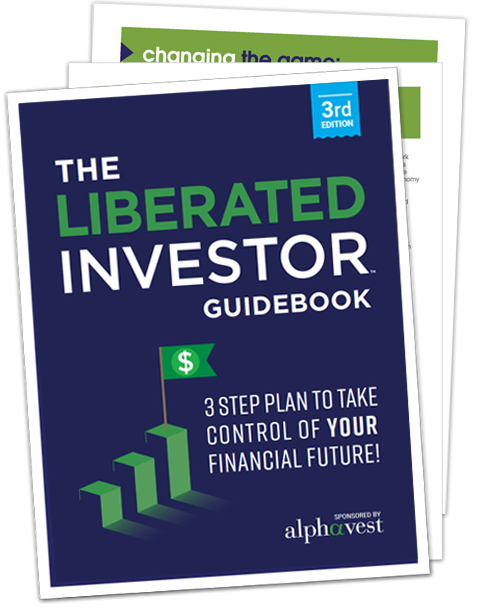The annual investment management fee at Alphavest is .65% per year paid quarterly. We charge .95% per year for customized investment and performance reports and quarterly and personalized consulting.
-
What does Alphavest charge?
-
Are there any other fees or expenses at Alphavest?
Yes. Folio Institutional, our custodian who will hold your assets in safekeeping, charges our clients .25% per year ($150 minimum) in lieu of commissions. No commissions, ever, no matter how many transactions occur. Alphavest does NOT share in this fee. Additionally, the investments within the account, unless single stockholdings, will charge their own separate fee, which, again we do NOT share in. For example your Alphavest portfolio may hold RSP, which charges an annual “expense ratio” of .40% per year. So, in all with an Alphavest management fee of .65%, Folio’s transaction charge of .25% and an average of investment expense ratios of .40%, your total annual fee would be approximately 1.30%.
-
Where is my money held?
Folio Institutional in McLean Virginia has been in the custodian business of safekeeping our clients assets since 2009. Folio was founded in 1999 by Steven Wallman, a former commissioner of the U.S. Securities and Exchange Commission widely recognized for advocacy on behalf of investors.
-
Does Alphavest have an account minimum?
No, Alphavest currently does not have an account minimum.
-
I don't live in the United States, can I still have an account?
Alphavest currently only operates in the United States, and for regulatory reasons cannot accept customers residing outside the country.
Customers must have a permanent U.S. address, a U.S. Social Security Number, and a checking account from a U.S. bank.
-
What is a 401(k) plan?
A 401(k) plan is an employer sponsored retirement savings plan that allows you to save on a tax-advantaged basis. There are two types of 401(k) contributions: Traditional and Roth. Traditional contributions allow you to defer pre-tax income from your paycheck. Roth contributions defer after-tax, but your withdrawal upon retirement is not subject to income taxes. Some employers may choose to match their employees’ deferral contributions, helping them further grow their retirement savings.
-
Should I always be saving?
The answer is YES. The reasons to not be saving are:
- You are retired/decumulating rather than saving.
- Your income is so low that you can’t save, i.e. you have no income left after taking care of life’s necessities.
- You have so much wealth already you don’t need to save more.
- A dollar of consumption is guaranteed to make you happier now than it will later.
If one of these isn’t true for you, than odds are you should be saving. You might not have any particular savings goals in mind, but we’ll help you with that too.
-
Paying off debt vs investing
Choosing whether to invest or pay down debt is a common question. As much as we would love everybody to become a Alphavest customer, there are certain situations where you should pay off debt before you open an account with Alphavest
First, you should make at least the minimum payment on all debts before investing. Not doing so can lead to penalties and added interest, in addition to ruining your credit score. For some debt like mortgages, this would be the full payment. For other debt like credit cards, the minimum payment is listed on your statement.
Second, you should typically make sure that you have enough cash to pay off the monthly balance on your credit cards before investing. The average interest rate on credit cards is 15%. Paying these debts down is equivalent to a guaranteed 15% rate of return on your personal balance sheet.
In general, any debt with an interest rate of 5% or above(1) is considered high and you should typically pay off that debt before investing.
Once high interest debt is eliminated, it makes sense for most people to consider investing. Not all debt is bad or should be viewed as a barrier to investing. Debt can be a valuable tool to help you reach your goals faster (such as a mortgage on a house), but it should be used in moderation. A good rule of thumb is to keep your total debt payments below one-third of your gross income.
If you proceed to open an account at Alphavest, it will be our understanding that you have read the above and have determined that you are not investing at the expense of making minimum payments on your debt or paying off high interest debt.
-
How can I rollover my 401(k), 403(b) or similar plan into an IRA at Alphavest?
From your plan administrator, you need distribution/rollover paperwork for your former employer. After you have opened your rollover IRA at Alphavest we can assist you in completing this paperwork with your new account information. An Alphavest advisor is available to walk you through this process.
Contact an Alphavest Representative M-F 8-5 by phone or email for personal assistance in this rollover process; 866 MO-ALPHA or [email protected].
-
What is the difference between fee-only?
Alphavest is a fee ONLY advisor, sanctioned by the National Association of Professional Financial Advisors (NAPFA). This means we operate in a “No Conflicts of Interest” zone. We sell no products nor do we receive any compensation from any investment companies to use their products. The latter is true for fee-BASED advisors.
-
What is the difference between AlphaManageIt! And AlphaChoose!?
With AlphaMangeIt! we will assign you the best allocation to suit your needs, with AlphaChoose! you get to pick from our range of investment models.
-
Do you publish the past performance of your strategies?
Yes. We update our models past performance quarterly on our website. Take the Alphavest Challenge to browse how our models have compared to your existing performance.
-
How do I open an investment account?
Easy. The entire process is online and it takes about 10 minutes. You can begin here. This will allow you to fully open your account at the Custodian Folio. We will then contact you to give you instructions on how to fund your account by wire transfer, check, or account transfer.
Or, contact an Alphavest Representative M-F 8-5 by phone or email for personal assistance in this rollover process; 866 MO-ALPHA or [email protected].
-
How are my assets (securities and cash) protected with an Alphavest account at Folio Institutional?
Folio Institutional is a member of the Securities Investor Protection Corporation (SIPC®). As a result, client’s assets are protected by SIPC, up to $500,000 in value, including $100,000 in cash awaiting reinvestment. SIPC provides protection for brokerage firms against losses should a SIPC member firm fail financially and become unable to meet obligations of its securities clients.
For additional security, Folio Institutional also provides coverage in excess of SIPC limits. In addition, all cash deposits are FDIC insured up to $4.5 million for individual accounts and $9 million for joint accounts. Neither SIPC nor FDIC insurance protect against losses resulting from a decline in the market value of securities. To learn more about how your assets are protected by Folio Institutional.
-
How should I decide which Alphavest Models/Investment strategies to choose?
Alphavest is for investors who are comfortable making basic choices regarding their equity investment portfolios. We’ve provided as much information as possible about how our Alphavest models are constructed, their investing style, their back-tested theoretical performance over time and the types of securities they hold.
If you still have questions, please don’t hesitate to contact an Alphavest Representative M-F 8-5 by phone or email for personal assistance in this rollover process; 1-855-GOALPHA (462-5742) or [email protected].
© 2022 Alphavest | All Rights Reserved | ADV Part 2A | ADV Part 2B | Privacy Policy


